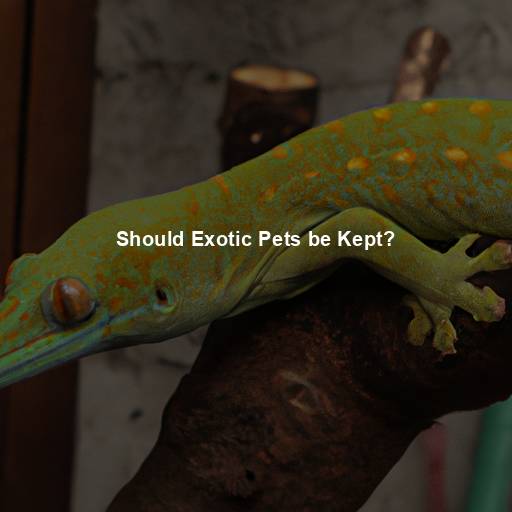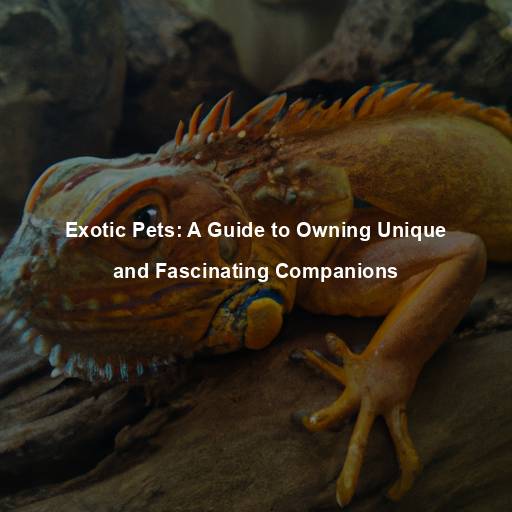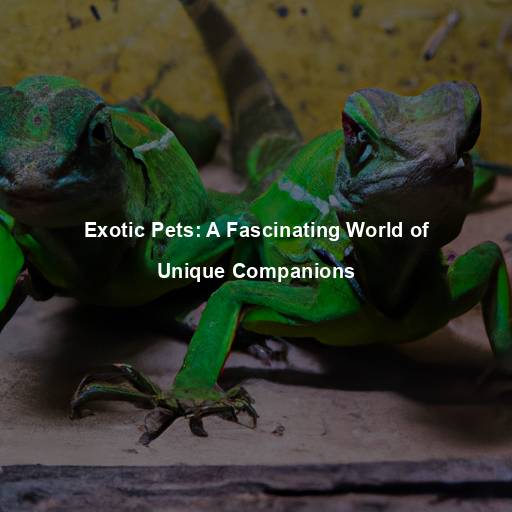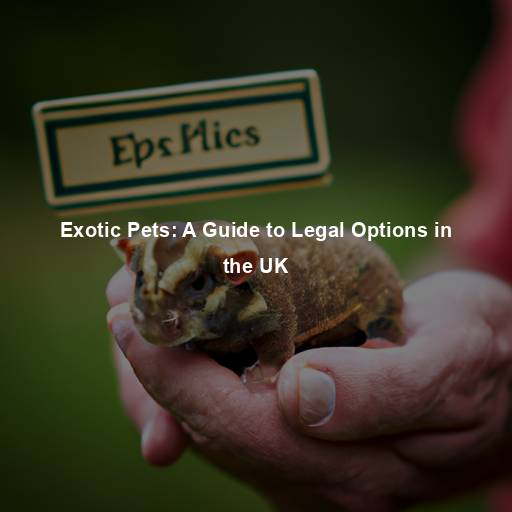Should Exotic Pets be Kept?
Last Updated on July 31, 2023 by Evan
Contents
In recent years, the popularity of exotic pets has been on the rise. From majestic big cats to unique reptiles, more and more people are opting to bring these extraordinary creatures into their homes. However, this growing trend has sparked a heated debate regarding the ethics and practicality of keeping exotic pets. In this article, we will delve into the various aspects surrounding the ownership of exotic pets, exploring the benefits, challenges, and ethical considerations associated with this controversial practice.
The Fascination with Exotic Pets
The Allure of the Unconventional
Human beings have always been fascinated by the extraordinary, the uncommon, and the exotic. The appeal of owning an exotic pet lies in the opportunity to possess a creature that is out of the ordinary, often boasting stunning colors, unique behaviors, and captivating features. These animals can create a sense of wonder and awe, allowing their owners to experience a deep connection with the natural world.
A Different Kind of Bond
The bond between humans and pets is a remarkable phenomenon. Pets provide us with companionship, unconditional love, and emotional support. When it comes to exotic pets, this bond can take on an even more profound meaning. The trust and connection established with a creature from a different habitat can be incredibly rewarding, offering a deeper understanding of the animal kingdom and fostering a sense of responsibility towards conservation efforts.
The Benefits of Exotic Pet Ownership
Educational Opportunities
Owning an exotic pet can open up a realm of discovery and enlightenment. These captivating creatures provide an unparalleled chance to delve into the wonders of the animal kingdom. Their very presence brings a tangible dimension to our learning experiences, inviting us to explore the intricate web of ecosystems and species diversity. As we observe and tend to these remarkable beings, a cascade of knowledge unfolds before us, revealing insights into their innate behaviors, dietary preferences, and environmental necessities.
Personal Growth and Responsibility
Caring for an exotic pet requires dedication, patience, and a considerable amount of responsibility. Owning an animal from a different habitat demands a deep understanding of its specific needs, including temperature control, specialized diets, and appropriate enclosures. By taking on these responsibilities, individuals can develop valuable life skills, such as time management, organization, and empathy. The experience of nurturing an exotic pet can foster personal growth and a heightened sense of compassion towards all living beings.
Conservation Efforts
Exotic pet ownership, when done responsibly and ethically, can contribute to conservation efforts. Many exotic pet owners actively participate in breeding programs and conservation initiatives aimed at preserving endangered species. By establishing captive populations and promoting sustainable practices, these individuals can play a role in safeguarding vulnerable animal species and their habitats. In some cases, the captive-bred offspring of exotic pets can be reintroduced into the wild, bolstering dwindling populations and helping to restore ecological balance.
The Challenges of Exotic Pet Ownership
Legal and Ethical Concerns
One of the primary challenges associated with exotic pet ownership is the legal and ethical framework surrounding it. Laws and regulations regarding the ownership of exotic pets vary significantly from one jurisdiction to another. While some countries have strict guidelines in place to ensure the welfare and safety of both animals and humans, others have more relaxed or insufficient regulations. This lack of uniformity can lead to instances of animal cruelty, illegal trafficking, and potential threats to public safety.
Specialized Care Requirements
Exotic pets often have very specific care requirements that can be challenging for the average pet owner to meet. From temperature and humidity control to complex dietary needs, providing appropriate care for these animals can be demanding, both financially and logistically. Many exotic pets require specialized enclosures, veterinary expertise, and access to a variety of live prey or unique supplements. Meeting these requirements can be time-consuming and costly, requiring a significant commitment from the owner.
Health and Safety Risks
Adventurous souls seeking the thrill of exotic companionship must heed the captivating call of caution. These tantalizing creatures, while enchantingly alluring, flaunt unpredicatable characteristics that can leave even the most ardent animal lover bewildered. Zoonotic maladies, stealthily coursing through the veins of extraordinary pets, may covertly pounce on unsuspecting humans, morphing into a harrowing public health saga. Moreover, the enigmatic behavior of certain species veils a menacing side, which, if unleashed, could imperil not only their tenders but the entire community at large.
Ethical Considerations
Welfare and Conservation
When we delve into the controversial topic of exotic pet ownership, a myriad of complex issues come to the forefront. Central to this debate is the crucial evaluation of the animals’ welfare, as we must consider the specialized care they often require in a domestic setting. It becomes perplexing when we realize that their natural behaviors may be compromised, leading to potential stress, boredom, or inadequate living conditions. Adding to the burstiness of the situation, we cannot overlook the detrimental effects that the extraction and transportation of these exotic creatures have on wild populations and their ecosystems.
Alternatives to Ownership
Instead of housing exotic creatures in our humble abodes, let us ponder over alternative means to admire and back these extraordinary beings. Zoos, sanctuaries, and academic establishments offer carefully curated spaces for us to marvel at and understand these creatures, all while safeguarding their welfare. These establishments act as sanctuaries for conservation efforts, dedicated to enlightening us, conducting in-depth research, and nurturing animals in dire straits. By throwing our support behind these noble organizations, we not only lend a helping hand in preserving rare species but also foster a profound respect for their rightful habitats.
Public Safety Concerns
The captivating allure of exotic pets has always sparked fervent debates, and for good reason. The concern for public safety takes center stage, as some of these extraordinary creatures possess an inherent danger that cannot be ignored. Unpredictability ensues when these animals are not equipped with the necessary training or socialization, exposing humans to formidable risks that can send shockwaves within communities. Escapes, attacks, and the grave act of releasing these exotics into the wild strike chords of distress, making it imperative for regulations to navigate through the labyrinth of potential harm by implementing stringent licensing, providing comprehensive education, and enacting robust enforcement measures.
Threats to Ecosystems
The introduction of non-native species into new environments can have detrimental effects on local ecosystems. Exotic pets that are released or escape into the wild can disrupt natural biodiversity, outcompete native species for resources, and spread diseases. These invasive species can upset delicate ecological balances and cause irreversible damage to habitats. It is essential to consider the potential ecological impact before acquiring an exotic pet, as the consequences of their release can be far-reaching and devastating.
Responsible Exotic Pet Ownership
Research and Education
Embarking on the eccentric endeavor of owning an awe-inspiring exotic pet warrants a journey through the enigmatic realm of research. Delving deep into the quagmire of knowledge about these captivating creatures becomes an imperative before taking the plunge. Engrossing oneself in the intricacies of the exotic’s habitat, nuanced behavior, intricate dietary needs, and gregarious social requirements forms the bedrock of responsible caretaking. Uncovering the labyrinthine tapestry of local laws and regulations doppelganging as gatekeepers to this captivating realm ensures both adherence to legality and steering clear of unsavory contributions to illicit wildlife trade.
Secure and Appropriate Enclosures
When it comes to exotic pets, their living arrangements can be as perplexing as trying to solve a Rubik’s Cube blindfolded. These creatures demand enclosures that cater to their wild tendencies, mirroring the very environment they came from. Think secure fortresses with ample space for roaming, complete with jungle gyms and interactive features that keep their minds sharp. But it doesn’t stop there – temperature control, proper airflow, and even a skylight for some natural vitamin D are all part of the package.
Veterinary Care and Nutrition
Ensuring the well-being of our exotic pets is a captivating journey filled with health mysteries and whimsical dietary puzzles. These extraordinary creatures boast distinct sets of needs that can’t be addressed through ordinary veterinary care. Consequently, it becomes paramount for pet enthusiasts to forge an unbreakable bond with a seasoned veterinarian who specializes in exotic animals, granting our beloved companions the enigmatic expertise they require. Equally enigmatic, nutrition plays a vital role in their perplexing world, as these creatures possess inscrutable dietary demands that can only be satisfied through the calculated guidance of a skilled veterinarian or the enigmatic wisdom of an exotic animal nutritionist, ensuring optimum vitality for our enigmatic cohorts.
Enrichment and Mental Stimulation
Exotic animals are intelligent and require mental stimulation to prevent boredom and promote their overall welfare. Providing a variety of toys, puzzles, and environmental enrichment activities can help mimic their natural behaviors and prevent destructive behavior caused by frustration or boredom. Spending quality time interacting, playing, and bonding with the exotic pet is equally important for their emotional well-being and the development of a strong human-animal bond.
The Role of Legislation and Regulation
Stricter Laws and Enforcement
In a world filled with diverse views and considerations, the debate surrounding the ownership of exotic pets continues to spark curiosity and concern. As the allure of these fascinating creatures persists, so too do the perplexing questions surrounding their welfare and the ethical implications of their captivity. Advocates for stricter legislation believe that a comprehensive approach is necessary, encompassing licensing procedures that thoroughly assess potential owners, compulsory educational programs that impart essential knowledge, and regular inspections to ensure the well-being of these extraordinary animals. By bolstering enforcement efforts, society can hope to discourage unlawful practices, promote responsible ownership, and promptly address any instances of cruelty or neglect.
Collaboration and International Cooperation
The issue of exotic pet ownership extends beyond national borders, as the trade in exotic animals often involves international networks. Collaboration and cooperation between countries are crucial to combat illegal trafficking, enforce wildlife protection laws, and promote responsible exotic pet ownership on a global scale. Sharing information, resources, and best practices can help address the challenges associated with the exotic pet trade and contribute to the conservation of endangered species.
FAQs – Should Exotic Pets be Kept
What are exotic pets?
Exotic pets refer to animals that are not native to a particular region or country and are unusual or rare to be kept as household pets. These can include reptiles, birds, amphibians, small mammals, and even certain types of insects.
What are some common examples of exotic pets?
Common examples of exotic pets include snakes, lizards, parrots, turtles, hedgehogs, sugar gliders, and tarantulas. These animals are distinct from traditional pets such as dogs and cats, which have been domesticated for thousands of years.
Why do people keep exotic pets?
People keep exotic pets for various reasons. Some are attracted to the uniqueness and beauty of these animals. Others may have a special interest in a particular species or find joy in caring for a creature that is not commonly kept as a pet. Additionally, people may keep exotic pets for educational purposes or to contribute to conservation efforts through breeding programs.
What are the potential risks and concerns of keeping exotic pets?
Taking care of exotic pets can be quite the adventure. These incredible creatures come with a whole host of quirks and challenges. From their unique nutritional needs to their unpredictable behavior, owners often find themselves on a perplexing rollercoaster ride. But it’s not just the owners who need to be cautious – these pets can also pose risks to their human caretakers and the environment if they escape or transmit diseases. It’s a fascinating world of burstiness and perplexity that comes with great responsibility.
Are there any legal restrictions on keeping exotic pets?
Yes, there are often legal restrictions on keeping certain exotic pets. Laws and regulations vary from country to country and even within regions. Some exotic species may require specific permits, licenses, or documentation to ensure responsible ownership and prevent the introduction of invasive species. It is crucial to research and adhere to local laws before considering keeping an exotic pet.
Should exotic pets be kept as pets?
Deciding whether to keep an exotic pet can be a perplexing predicament, with an array of factors to consider that can leave one’s mind swirling like a tornado. From the depths of our knowledge to the heights of our ability, we must strive to satisfy the intricate needs of these unique creatures whilst grappling with the daunting risks and ethical quagmires that loom like dark shadows in the night. As we embark on this mysterious journey, let us make it our solemn duty to delve deep into the recesses of research, exploring the requirements, behaviors, lifespan, and potential health detours that lie ahead. And in our quest for conscientious pet-keeping, let us shine a light on the path less traveled, embracing the noble act of adopting from sanctuaries and rescue organizations instead of unwittingly fueling the fire of the exotic pet trade.







